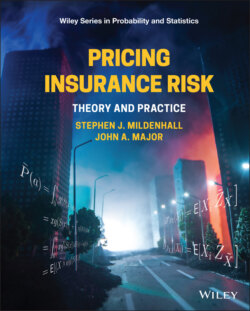Читать книгу Pricing Insurance Risk - Stephen J. Mildenhall - Страница 40
3.3.2 Systemic Risk
ОглавлениеSystemic risk affects a financial system consisting of many interacting agents or firms and is created by that system’s operation or structure. It occurs when an event causes a chain reaction of consequences. So-called systemically important financial institutions or SIFIs—those deemed too big to fail—generate systemic risk. They are so interconnected and interwoven in the financial system that the failure of one would have dire consequences for all. Systemic risks are often triggered by exogenous shocks such as the oil crisis of the 1970s or the failure of Long-Term Capital Management. The October 1987 Black Monday crash and Global Financial Crisis (GFC) of 2008 are two examples where losses from systemic risk emerged suddenly but endogenously. Systemic risk is linked to complex webs of contracts, collateral valuation, and duration transformation, where the system relies on a fragile confidence that can quickly erode. Systemic risks are by nature nondiversifiable (Brunnermeier and Oehmke 2013)
Property-casualty insurers are not usually regarded as systemically important financial institutions, although some large life insurers and AIG were designated as SIFIs by the Financial Stability Board after the GFC. A large, highly connected reinsurer could generate systemic risk if, for example, its failure would cause knock-on insolvencies. Insurers themselves are generally not regarded as systemically risky because they have liquid assets and illiquid uncallable liabilities (Chen et al. 2013).
The interaction of rating plans as another example of systemic risk for insurers. Adverse selection against a rating plan can cause realized rates to be lower than expected, through a combination of adverse selection and winner’s curse. The effect is on premium rather than loss.
In a catastrophe, many insureds are subject to the same occurrence. Such risks are systematic (nondiversifiable) but not systemic. The risk arises as the result of an outside event and is not caused or exacerbated by the operation of the system.
Example 5 The October 1987 Black Monday stock market crash was a largely unexpected and sudden global decline in share prices. The Dow Jones Industrial Average fell 22.6% in one day. It was partially caused by the widespread use of portfolio insurance, which triggered sell orders in a declining market. Long-Term Capital Management was a hedge fund that failed in 1998 due to a combination of high leverage and exposure to the 1997 Asian financial crisis and 1998 Russian financial crisis. Its history is told in Lowenstein (2000).
